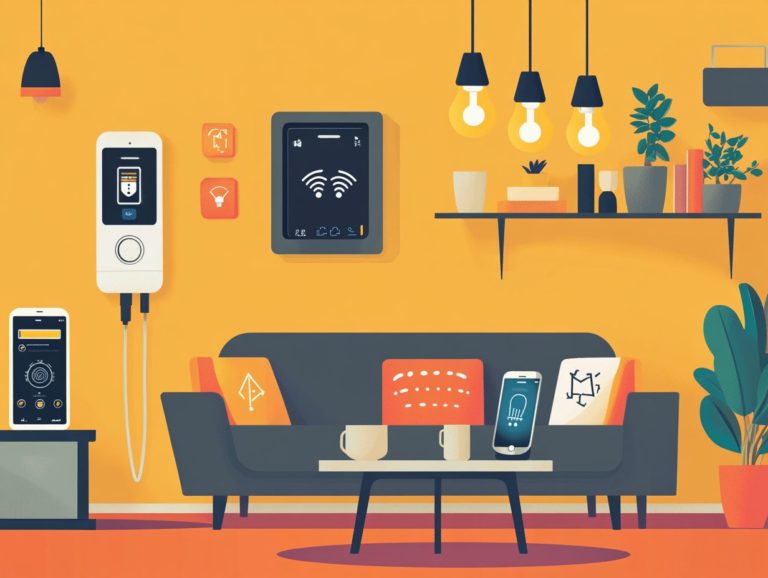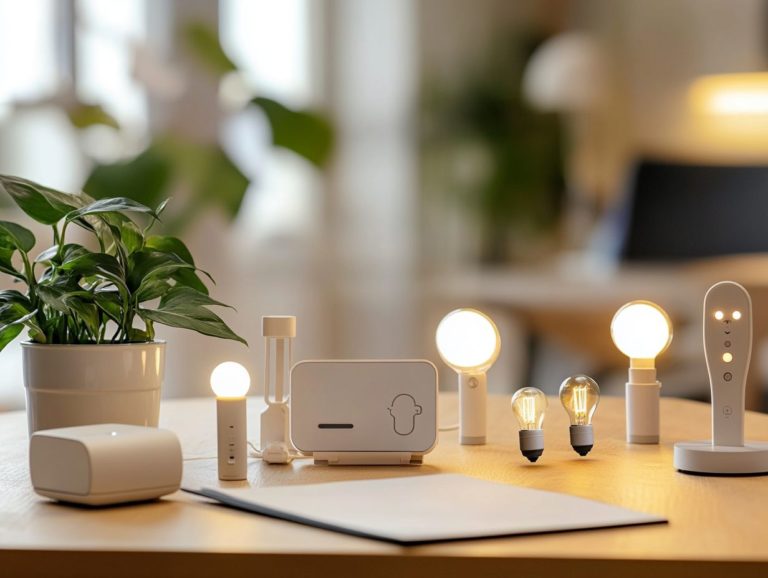5 Must-Have Smart Appliances for Sustainable Living
In a world increasingly dedicated to sustainability, smart appliances are becoming your essential allies in the quest for eco-friendly living.
Let s explore five exciting devices that make eco-friendly living easy!
From smart thermostats that optimize heating to intelligent refrigerators that minimize food waste, these technologies simplify the journey towards a greener lifestyle.
You ll discover their key features, any potential drawbacks, and how they can lead to long-term savings on your utility bills.
Join in to uncover how these must-have appliances can transform your home into a sustainable haven.
Contents
- Key Takeaways:
- 1. Smart Thermostats for Energy Efficiency
- 2. Smart Water Systems for Conservation
- 3. Smart Lighting for Reduced Energy Consumption
- 4. Smart Refrigerators for Food Waste Reduction
- 5. Smart Washing Machines for Water and Energy Savings
- How Do Smart Appliances Contribute to Sustainable Living?
- How Can Smart Appliances Help Reduce Utility Bills?
- What Are the Potential Drawbacks of Smart Appliances?
- What Are the Long-Term Savings of Investing in Smart Appliances?
- How Can One Incorporate Smart Appliances into Their Home?
- Frequently Asked Questions
- 1. What are the benefits of using 5 Must-Have Smart Appliances for Sustainable Living?
- 2. What are the top 5 Must-Have Smart Appliances for Sustainable Living?
- 3. How do smart appliances contribute to sustainable living?
- 4. Can smart appliances help save money on utility bills?
- 5. Are there any government incentives for purchasing smart appliances for sustainable living?
- 6. How can I ensure I am making sustainable choices when purchasing smart appliances?
Key Takeaways:
“`html
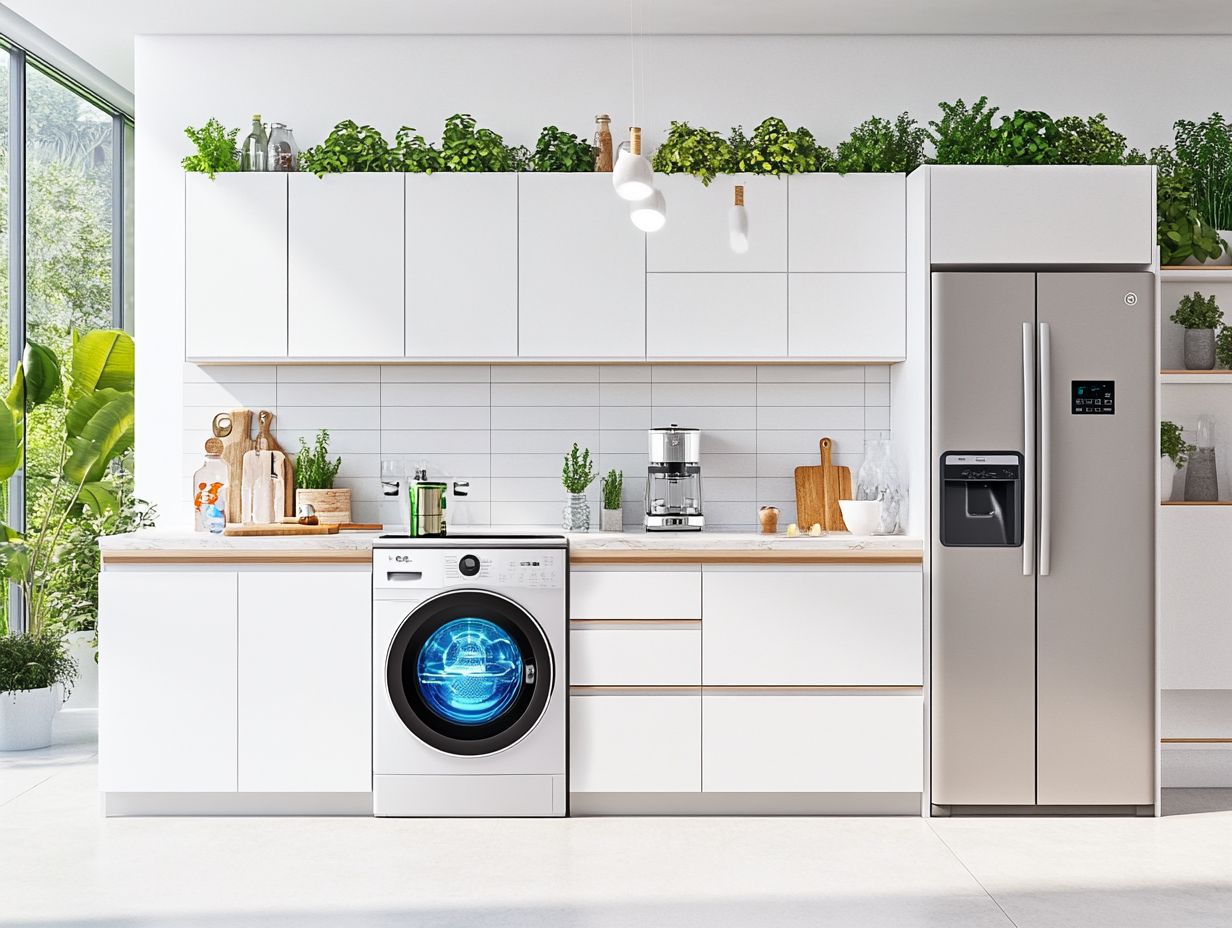
- Upgrade to smart thermostats for energy efficiency and reduced utility bills.
- Save water and conserve resources with smart water systems.
- Opt for smart lighting to reduce energy consumption and save money.
Don’t wait—upgrade to these smart energy solutions for modern homes today and start saving!
“`
1. Smart Thermostats for Energy Efficiency
Smart thermostats, such as the Nest Learning Thermostat, are essential gadgets for any modern home, designed to save energy.
These devices adapt to your preferences over time. They also integrate effortlessly with a variety of smart home hubs, which are devices that help control various smart appliances in your home.
With cutting-edge sensors and sophisticated algorithms, these devices use advanced sensors. They adjust temperatures based on your occupancy and lifestyle patterns, ensuring optimal comfort while minimizing energy waste.
Research indicates that homes equipped with these smart thermostats can slash energy consumption by up to 15%. This translates into considerable savings on your monthly utility bills.
Their remote access feature allows you to control your home easily, positively impacting both your finances and the planet.
2. Smart Water Systems for Conservation
Smart water systems represent a big step in home automation, delivering efficient solutions for water conservation and management in your modern residence.
These cutting-edge systems harness sensors and advanced technology to track your water usage in real-time.
They ensure your home meets its water needs intelligently. Features like leak detection alert you to any moisture anomalies, enabling you to take immediate action to prevent costly damages and avoid unnecessary waste.
Automated watering schedules are tailored to the specific needs of your garden or lawn. They adjust seamlessly based on weather forecasts or soil moisture levels.
By optimizing water flow and minimizing unnecessary consumption, these systems are essential for lowering your utility expenses while promoting sustainable practices that benefit both the environment and your household budget.
3. Smart Lighting for Reduced Energy Consumption
Smart lighting systems, like Philips Hue, are essential in the world of home automation, designed to reduce energy consumption while enhancing the ambiance of your living spaces.
These advanced systems enable you to customize schedules and control the lighting remotely through a smartphone app, offering unmatched convenience.
Picture this: your lights slowly brighten at sunrise, or you effortlessly adjust the hue to match your mood with a simple tap on your device.
Their energy-efficient technologies significantly cut down on electricity usage compared to traditional incandescent bulbs.
In fact, by adopting smart bulbs, you could save up to 80% on lighting costs, making them not only an innovative choice but also a financially astute one.
4. Smart Refrigerators for Food Waste Reduction
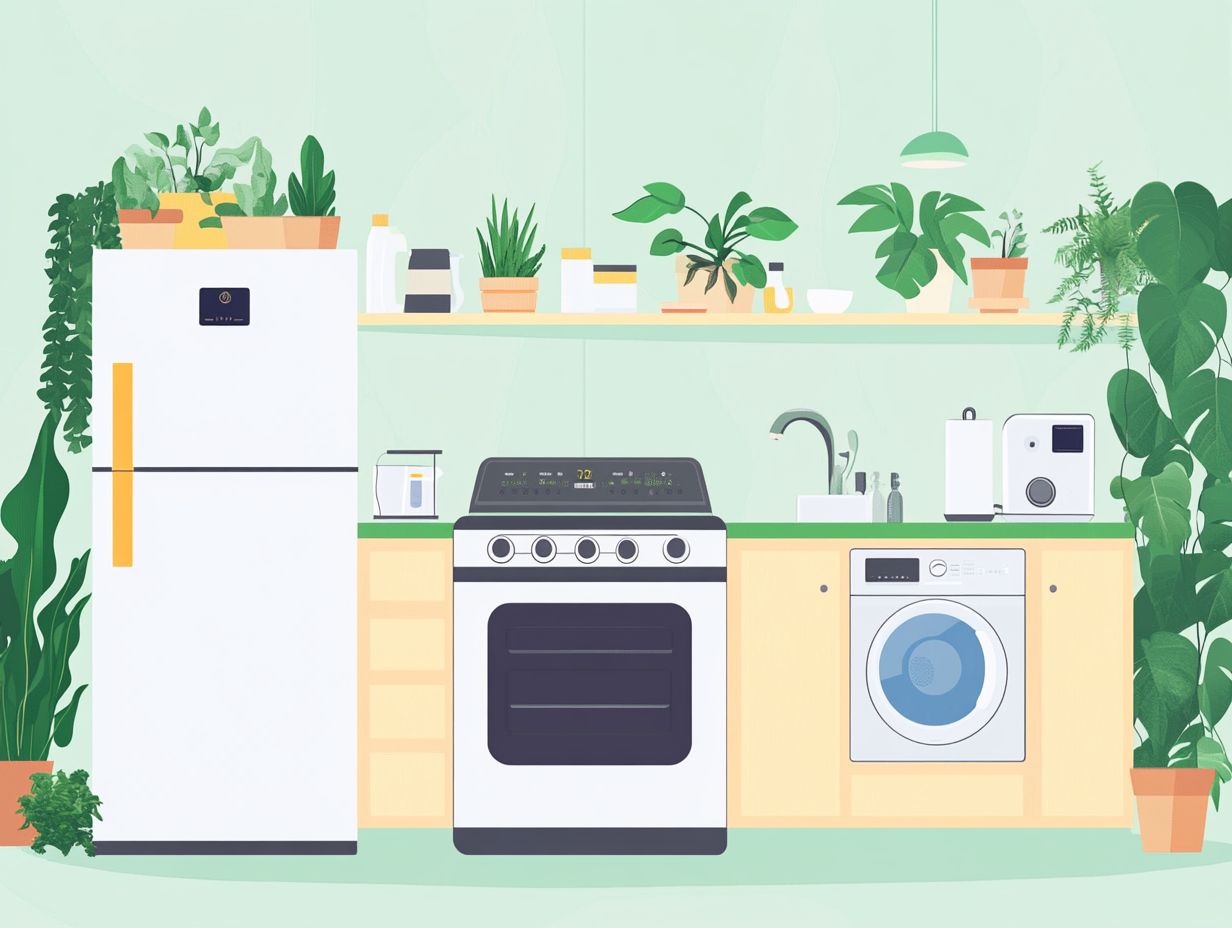
Smart refrigerators are revolutionizing the way you manage food storage and consumption. They play a crucial role in reducing food waste and enhancing energy efficiency in your modern home.
With features like inventory tracking, these innovative appliances let you keep a close watch on what you have. This makes meal planning a breeze and helps you avoid unnecessary purchases.
Expiration alerts act as considerate nudges, ensuring you use items before they spoil, thus minimizing waste. Energy-saving modes fine-tune power consumption during inactive periods, leading to lower utility bills.
These technologies support your sustainable living efforts. Together, they transform your household s approach to food management, paving the way for more responsible consumption habits.
5. Smart Washing Machines for Water and Energy Savings
Smart washing machines lead the charge in conserving water and energy. They revolutionize laundry routines for the modern household.
With advanced technology that detects how much laundry is inside the machine, these machines automatically adjust water levels and cycle durations based on your load. This ensures that no precious resources are wasted.
Many models come equipped with wash cycles that save energy and water. This not only reduces your environmental footprint but also results in significant cost savings over time.
Get ready to enjoy lower utility bills and reduced water consumption. Each wash becomes not just clean but also a responsible choice for the planet.
How Do Smart Appliances Contribute to Sustainable Living?
Smart appliances transform the way you think about sustainable living. They seamlessly integrate advanced technology to optimize your energy and water consumption at home, encouraging eco-friendly habits.
Take smart thermostats, for instance. They can learn your family’s schedule, adjusting heating and cooling as needed. This could lead to energy savings of up to 15% each year.
In the kitchen, smart refrigerators not only keep your food fresh but also remind you of expiration dates. They operate in energy-efficient modes, potentially slashing energy use by around 20%.
Modern washing machines equipped with smart features automatically adjust water levels based on your load size. This helps you save nearly 30% on water.
Altogether, these smart appliances promise to lower your utility bills and support a more sustainable lifestyle by significantly reducing your household’s carbon footprint.
What Are the Key Features of Smart Appliances?
Smart appliances offer an array of essential features that enhance convenience, efficiency, and sustainability in home automation. They are a must-have in today s households.
With remote monitoring capabilities, these advanced devices enable you to oversee your energy consumption from anywhere using mobile apps. This functionality not only delivers real-time insights into your usage patterns but also helps you pinpoint opportunities for savings.
Their energy tracking features allow you to set goals and receive notifications if you exceed your limits. These appliances also work well with leading smart home hubs like Amazon Echo or Apple HomeKit, integrating seamlessly into your existing ecosystem. For a deeper look into how technology can enhance efficiency, check out the top smart home security devices that save energy.
This allows for voice-activated control and automating energy-saving routines. Collectively, these innovative features enhance energy efficiency, and incorporating 5 eco-friendly energy efficiency hacks fosters a more sustainable living environment that aligns with modern values.
How Can Smart Appliances Help Reduce Utility Bills?
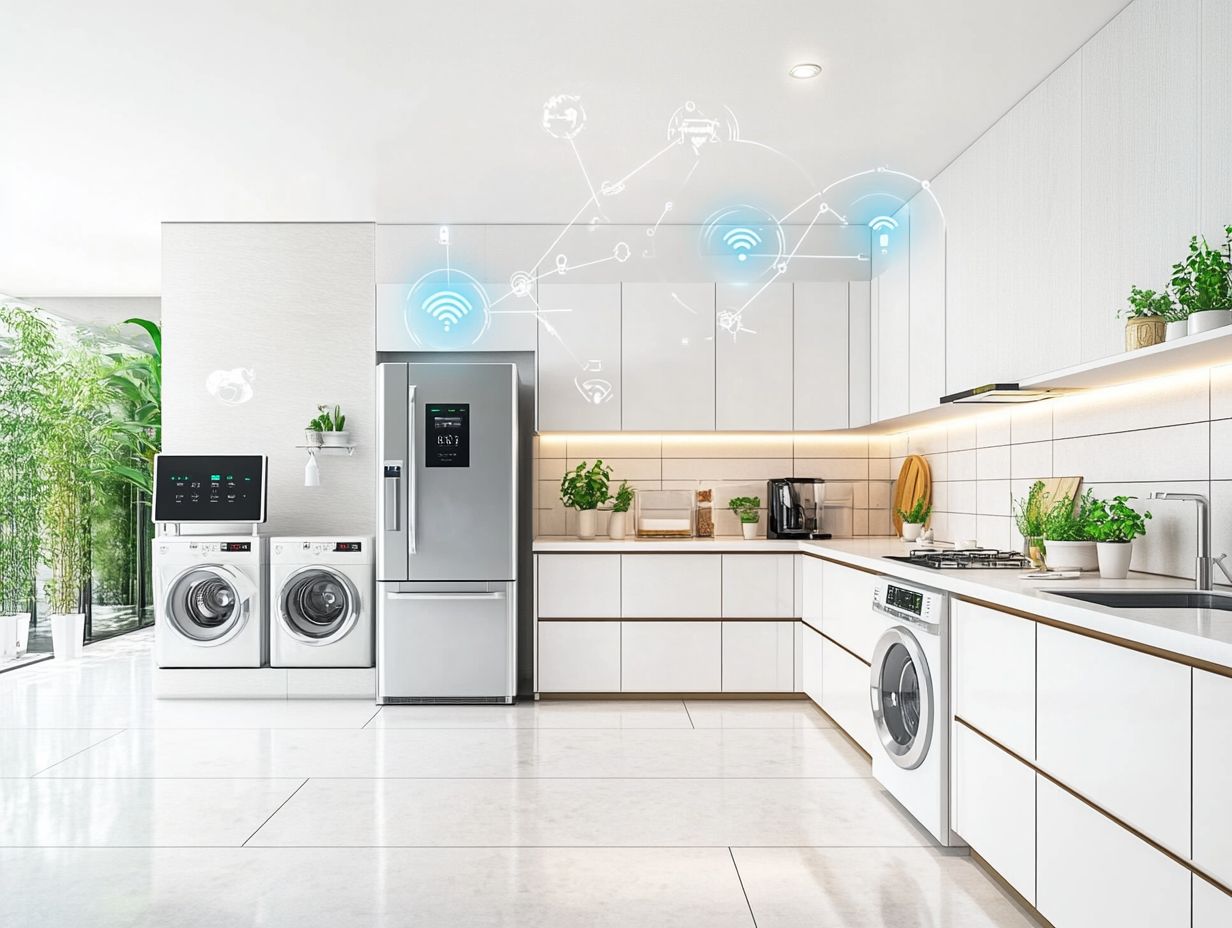
Smart appliances are designed to significantly lower your utility bills by harnessing cutting-edge technology to boost energy and water efficiency in your everyday tasks.
Take, for instance, smart thermostats that learn your routine and adjust the temperature just right, ultimately trimming down your heating and cooling expenses. Imagine saving 15% on energy bills just by using smart thermostats! It s a game-changer!
In a similar vein, smart washing machines come equipped with sensors that determine the optimal water level for each load. This reduces water waste and cuts costs on both water and electricity.
Over time, incorporating these innovative appliances into your home can lead to substantial long-term savings, making them an excellent investment for those who care about the environment. For more ideas, check out the top smart home devices for eco-friendly living.
What Are the Potential Drawbacks of Smart Appliances?
While smart appliances bring many benefits, they come with their own set of potential drawbacks such as security concerns and the challenges of integrating them into your existing systems. These issues can pose significant hurdles, particularly regarding data privacy, as sensitive information about your household habits could be at risk.
The high initial costs of purchasing and setting up these advanced devices might make you think twice about jumping on the bandwagon. You may also encounter frustrations with inconsistent or unreliable Wi-Fi, which can disrupt the seamless operation of your smart home ecosystem and lead to diminished functionality.
These drawbacks may also increase energy consumption as devices struggle to connect and communicate effectively.
What Are the Long-Term Savings of Investing in Smart Appliances?
Investing in smart appliances and smart home devices can lead to remarkable long-term savings by boosting energy efficiency and trimming down those utility bills over time.
These innovative devices, including smart speakers and smart plugs, are designed to optimize energy consumption, allowing you to reap the rewards of lower costs on your monthly statements. For instance, a recent study revealed that households using smart thermostats enjoyed an impressive 15% reduction in heating and cooling expenses each year. Additionally, exploring 5 ways to utilize smart home tech for savings can further enhance your energy efficiency.
Smart refrigerators and dishwashers take it a step further, monitoring usage patterns and scheduling operations during off-peak hours, which can significantly slash energy bills. When you weigh the initial investment against these substantial savings from smart home gadgets that save you money, the path to financial efficiency becomes crystal clear.
How Can One Incorporate Smart Appliances into Their Home?
Incorporating smart home devices into your home can be a seamless process that elevates your lifestyle while championing energy efficiency and sustainable living.
With a bit of planning and the right tools, you can transform your living space into a modern haven of convenience, utilizing a smart home hub, which is a central device that connects all your smart gadgets. Begin by evaluating your current home automation system, as compatibility is essential for smooth integration.
Research various smart appliances and smart lights that fit your home’s specific needs, keeping in mind factors like energy consumption, functionality, and user reviews. Once you’ve selected the perfect devices, the installation process is usually straightforward—simply follow the manufacturer’s guidelines, ensure Wi-Fi connectivity, and integrate them into your existing home automation setup. Additionally, consider how smart home technology for reducing environmental impact can further enhance your energy efficiency.
To truly maximize the benefits, use a voice assistant to make it a habit to regularly update the software, schedule routine maintenance, and take advantage of compatibility features with other smart products. This way, you’ll create a cohesive and efficient digital ecosystem, perhaps utilizing products from brands like Philips Hue and Google Home, as well as exploring popular smart home brands for sustainability that enhance your home experience.
Frequently Asked Questions
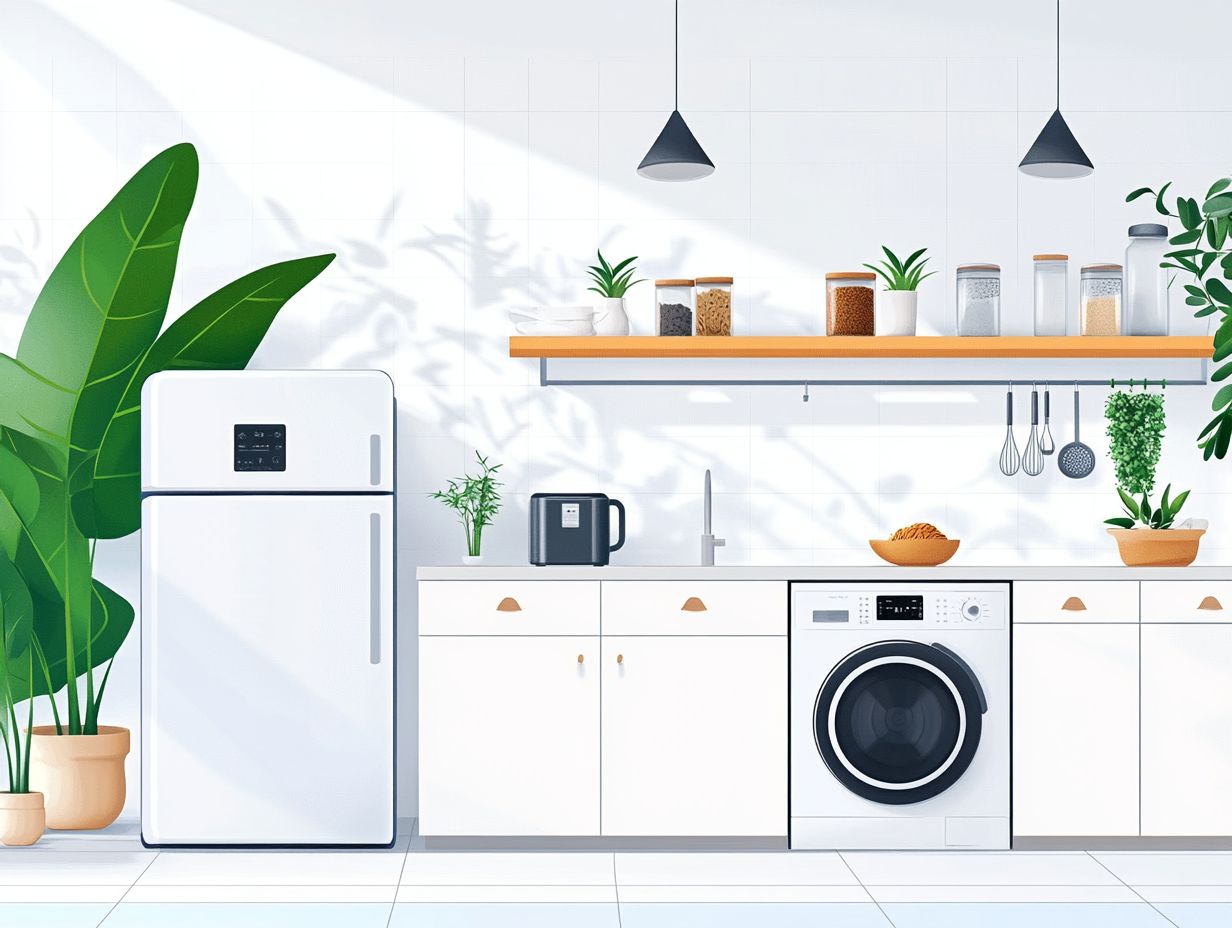
1. What are the benefits of using 5 Must-Have Smart Appliances for Sustainable Living?
Using 5 Must-Have Smart Appliances for Sustainable Living brings many benefits. You can reduce energy use, save money on bills, and help the environment.
2. What are the top 5 Must-Have Smart Appliances for Sustainable Living?
The top 5 Must-Have Smart Appliances are smart thermostats, energy-efficient refrigerators, smart washers and dryers, smart lighting systems, and home security cameras.
3. How do smart appliances contribute to sustainable living?
Smart appliances like smart locks and robot vacuums have settings that save energy and can be controlled remotely. This helps users reduce energy consumption effectively.
4. Can smart appliances help save money on utility bills?
Yes! Smart appliances, including smart air purifiers, are designed to be energy-efficient, lowering your electricity and water bills. Features like remote control and real-time monitoring help you adjust your usage for savings.
5. Are there any government incentives for purchasing smart appliances for sustainable living?
Absolutely! Many governments provide tax credits for buying energy-efficient appliances. This is a great way to save money while going green!
6. How can I ensure I am making sustainable choices when purchasing smart appliances?
Look for the ENERGY STAR label; it indicates the product uses less energy than standard models. Research brands like iRobot or Arlo that focus on sustainability and eco-friendly products.



